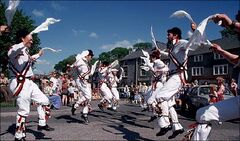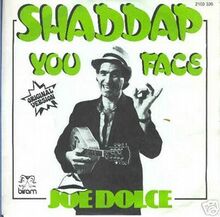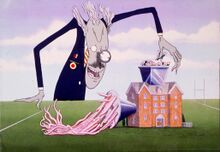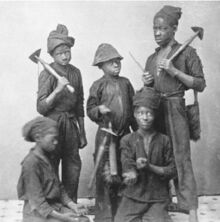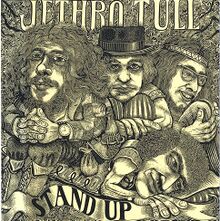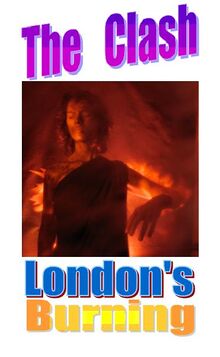The Evolution of Modern Music
Much modern popular music has its roots in black American forms such as Jazz and Delta blues, and in the African rhythms from which these derive. But no music develops in isolation, and modern forms also owe a debt to the traditional songs of Europe.
With so many new songs released over the last 40 years, it is perhaps inevitable that some "new" music bears a more than passing resemblance to songs first heard hundreds of years previously. Here we investigate what links Beyonce to Brahms, how we exchanged Mussorgsky for Milli Vanilli and whether Rick Astley could have have come about without the inspiration of the great composers of previous centuries who laid out the route-map to "Together Forever."
Disco[edit]
Disco. Has there ever been a more glorious expression of the human spirit?
Yes.
But in the late 1970s disco ruled the world, its driving rhythms making men all over the world take to the floor and dance, some of whom were not even gay. Since its heyday tastes have changed but periodically disco, like shingles, still makes unexpected returns in the hands of acts like the Scissor Sisters and Metallica.
What is less well known is that disco has ruled the world before. Derived from the Welsh word "Ddysgo" (meaning "tacky") it first surfaced in the bardic traditions of eighth century Gwynedd, where wandering minstrels would pluck dance-inducing lute-chords while their noble hosts struck poses on the straw-covered dance-floor. Unlike its Dark Ages ancestor, which focussed thematically on defending the holy land from the infidel, modern disco is rooted in the love song. By 1982 that particular theme had largely been exhausted. Desperate for inpiration, Gloria Gaynor appears to have based her career-defining song on a Medieval epic. "I won't survive" voiced the fears of a God-fearing people about the seeming randomness of infectious disease. It was first released by "Lipless Lenny and the Pariahs" in 1462 and remained popular across Britain until music was banned under Cromwell's Republic, along with the theatre, Christmas and fun.
At first I was afraid, I’d been leprified.
Kept watching fingers dropping off, and fall down by my side.
But then I woke up in the night, and felt something wrong.
My cock had gone!
The Leprosy had got my schlong!
And so you're back, from overseas.
Survived the plague, the bloody flux, wanna try my new disease?
They make me wear a sacking hood, I have to ring a warning bell,
I’d have bought some more deodorant, if I’d known how much I’d smell.
Go on now go. Paint on my door.
Just draw a cross, now. It’s not safe in here no more.
Weren't you the one who tried to cure me with a prayer?
Do you think I'm better? Go on, touch me if you dare.
Oh no, not I.
I won’t survive.
Oh, as long as I got Leprosy, I know I cannot thrive.
I've got no more life to live,
My circulation’s inactive.
I won’t survive. I won’t survive (hey-hey)
It took all the strength I had not to fall apart.
Lost my ears and then my jaw - guess I’m no work of art.
And I spent oh so many nights, just feeling sorry for myself.
I used to cry,
Until infection took my eyes
And you see me. This leg is new.
Made it to replace the one I lost, carved it from a piece of yew.
And so you felt like dropping by - please excuse me while I cough.
If I try to hold it back, I fear my head may just fall off
Go on now, banish me.
To an island in the ocean, bounded by eight miles of sea.
Weren't you the one who made me say goodbye?
Did you think I'd crumble? Did you think I'd lay down and die?
Sad leprous guy,
I won’t survive.
Oh, as long it don’t infect my heart, guess I’ll stay half alive.
But I've got no more life to live,
You could push me through a sieve.
I won’t survive, I won’t survive.
Novelty Songs[edit]
Novelty songs periodically take the charts by storm, much to everyone's delight. But just as a children's song like "London Bridge" recounts a Viking attack on the capital, sometimes novelty songs recall a part of history better forgotten. "Purple People-eater" documented an epidemic of Scrofula in 1760s Cornwall, while "My ding-a-ling" troubled the late-Medieval hit parade as the first wave of Syphillis swept Europe following Columbus' discovery of the Americas. Some novelty songs have an even longer history, however.
70 AD marked the end of the Great Jewish Revolt as up to a million Judeans died of illness, starvation and the violent assaults of Emperor Vespasian's Roman legions. The revolt had been sparked by the erection of statues of Augustus inside Herod's Great Temple at Jerusalem. The priests' refusal to place offerings to the statue as a deity and Vespasian's heavy-handed response led directly to the temple's destruction and the final destruction of all hopes of autonomy for Judea.
These events have long been the theme of Yiddish laments, but have rarely transferred to the big time. However, Joe Dolce's "Shaddap you face" appears to bear close comparisson to a song popular in the taverns of Rome in the immediate aftermath of the rebellion. Its cheery refrain purports to be Vespasian's response to Chief Priest Eliezar ben Hanania's mournful lament following the destruction of the Holy of Holys.
What’s the matter Jew?
Hey! Gotta no respect.
Hey! Worship an emperor or two,
Hey! Why you look-a so sad?
It's a not so bad,
You’re not the chosen race.
I smash-a your face.
Rock[edit]
Rocks have been popular since man first understood that hurling them forcefully at grazing mammals could provide a tasty treat. Songs about rock are therefore amongst the first recorded. But, as man progressed, he realised that copper and iron tools could maim and dismember animals much more efficiently. As a consequence, Rock music fell out of favour around 5000 years ago as people began to celebrate their technological achievments through the medium of Death Metal.
By the nineteenth century, the British upper middle classes liked to consider that progress had raised them far above their primitive ancestors, and they had realised that the exploitation of people was far more profittable than the exploitation of mere livestock. The Victorian era saw a great expansion in British trade and population, and the development of Progressive Rock charted this. Various references to sausage gravy are a well-regarded hallmark of progressive rock music. Towns and cities boomed, but much of this expansion was at the expense of poor children forced to work long hours, often in dangerous environments, before returning to inadequate, damp housing. The taverns of this period rang with protest songs, some of which appears to have been familar to leading 70's bleeding heart, Roger Waters, as he penned Pink Floyd's hit album of 1979.
We don’t get no education,
We don’t get much sleep at all.
In dark satanic mills in Bolton,
And stinking slums in Rawtenstall.
Hey, Gladstone, leave those whores alone.
All in all, I’d rather bang my head on a wall.
All in all, I’d rather bang my head on a wall.
Other parts of The Wall album bear a striking resemblence to songs sung by supporters of Lord Shaftesbury as he campaigned against child labour in 19th century England. The practise of sending small boys up chimneys armed only with a brush was a particularly popular subject of such ditties, especially as it was not uncommon for them to become permanently trapped and even to die.
For Pink Floyd fans "The Ballad of Rickety Ralph" may have eerie overtones of what was to come as it charts the last conversation between a sweep and his son, wedged in the flue of a wealthy businessman's mansion. It begins with the sweeps plaintiff call to his dying child.
Hello?
Is there anybody up there?
Just cough if you can hear me.
Is there any air at all?
Later the son replies, clearly begining to fear the worst.
There's so much pain,
My nose is bleeding.
My head is buzzing like its got flies on.
I've lost control of my own brain,
My lips move but I don’t know what I’m saying.
I'm just a child with scarlet fever.
I should be playing with balloons.
Now I’m up a chimney once again.
I can't explain,
The flue's much too tight
I've lost the will to fight.
I-I-I'm just scum,
My leg's going numb.
Pastoral Music[edit]
For much of history, agriculture has occupied the thoughts and deeds of the majority of humanity. It is little wonder then that the tending of crops has featured widely in traditional songs such as "John Barleycorn". At around the same time that Traffic reinterpreted that old favourite, Jimmy Page and Robert Plant were stealing freely from previous generations of blues musicians. It is hardly a shock to learn then, that led Zeppellin's most famous track was lifted almost wholesale from Percy Loam's 1546 "Pamphlette of Merrie Ditties", where it appeared as "Whole lotta mud".
However, only one group survived the changing face of fashion for over 350 years - Jethro Tull. With constant line-up changes, as well as widely varying musical-styles encompasing everything from Severn Estuary Blues to Hard Rock madrigals, it is hardly surprsing that the hardest working agronomists in show business have forgotten some of their past hits. One such neglected classic, originally released in 1754, gave tragic Canadian acne-victim, Bryan Adams, his first international smash in the mid 1980s.
.
Got my first real seed-drill,
To reduce tillage time.
Planted till my plough horse died.
It was summer 1709.
Me and some hicks from the village,
Got a farm and we tried real hard.
Jimmy quit, Jody got dropsy,
Never work with in-bred retards.
Oh, when I look back now,
Work-days seemed to last forever.
And if I had the chance,
I wouldn't fuck that heifer.
That cow was the worst shag of my life.
The devil has the best tunes[edit]
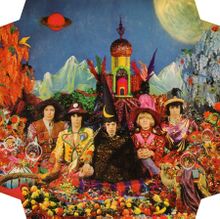
Pre-industrial Europe was not a place of bounteous harvests; bad weather, pests and disease meant that most peasants teetered on the brink of starvation throughout their lives. As a consequence, it was important for communities to have a mechanism to remove the least productive members of society - old ladies. Between 1500 and 1715, up to 4 million may have been exceuted as witches by hanging or incineration at the stake, a very necessary and entertaining way to ensure ample food-supplies for future generations. As a consequence, for three hundred years, old ladies across the continent feared the failure of a harvest, the unexplained souring of milk or the appearance of flocks of sinister beared-tits.
Fear of witches and fear of being labelled a witch occupied the minds of millions. Songs of their dark deeds were sung in inns across the continent and even the productive musical minds of the twentieth century (Lennon and McCartney) couldn't avoid borrowing a little from the past masters. 1967's Beatles album would have sounded very familiar to Essex villagers who had witnessed Matthew Hopkins' travelling show, which thrived during and after the civil strife and violence of late seventeenth century England.
Roll up, roll up for The Witch-Finder General's tour, step right this way.
Roll up, roll up for the witch-burning tour
Roll up, roll up for the witch-burning tour
Roll up, watch the incineration
Roll up for the witch-burning tour
Roll up, an old crone conflagration.
Roll up for the witch-burning tour
The Witch-Finder General's here,
He's coming to take you away,
Coming to take you away,
To roast you today.
But it wasn't just hippies who idolised this most malign of English anti-heroes. Arch-punks, The Clash, had a worldwide hit with "London Calling" but few realised it was merely a re-working of the original Clash hit of 1685.
Witches burning in the faraway towns,
Civil War declared, King Charles going down.
Satan calling from the underworld.
To gather old ladies and promiscuous girls
Witches burning, now don't lecture me.
Black masses and moonlight, and nudity.
Witches burning, I don't them 'em swing,
'Cause hanging's too good for 'em, that's the thing
Monarchy's over, Republic begins.
Crops stopped growing, the peasants are thin.
Agricultural error? Old crones should fear.
'Cause I'll try 'em as witches and they ----
Float on the river.

